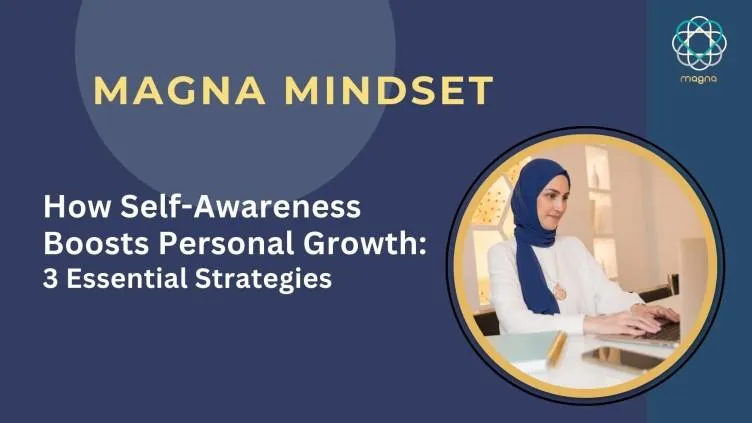See Our Latest Blogs
BLOG

How Self-Awareness Boosts Personal Growth: 3 Essential Strategies
Self-awareness is more than a buzzword in the realm of personal growth and self-improvement. It's a critical tool that can unlock new levels of success and happiness. In this article, we'll explore three essential strategies to use self-awareness to boost personal growth.
1. Recognizing Limiting Beliefs and Patterns
One of the primary aspects of personal growth is the ability to identify and overcome limiting beliefs and patterns. These self-imposed barriers can hinder your progress and keep you from reaching your full potential. But how can you overcome them? The answer is through self-awareness.
Self-awareness allows you to take a closer look at the beliefs that are holding you back. You can start to question their validity and gather evidence that contradicts them. For example, a belief that you're not smart enough to pursue a specific goal may have been ingrained since childhood, but self-awareness can help you challenge and change that belief.
Example: Let's say you've always wanted to start your own business, but a limiting belief that "only highly educated people can run successful businesses" holds you back. This belief might stem from experiences in your past or societal stereotypes. Through self-awareness, you start to challenge this belief by researching successful entrepreneurs who aren't necessarily highly educated but are driven, creative, and innovative. You begin to see that your belief isn't absolute truth, and this realization starts to break down the self-imposed barrier and opens up new possibilities for personal growth.
2. Enhancing Communication Skills
Communication skills are at the core of emotional intelligence and personal growth. They help you connect with others on a deeper level, foster trust, and resolve conflicts more effectively.
By enhancing your communication skills through self-awareness, you can express your thoughts and emotions more clearly, understand non-verbal cues, and respond in a more compassionate manner. This improvement not only strengthens relationships but also promotes personal growth by developing your ability to problem-solve and negotiate.
Example: Consider a situation where a coworker or a friend often misunderstands you. You often leave conversations feeling frustrated and unheard. By becoming more self-aware, you realize that perhaps you tend to speak quickly, use a lot of technical jargon, or not listen fully to the other person's responses. Armed with this insight, you decide to slow down your speech, use simpler language, and practice active listening. Over time, you notice a significant improvement in your interactions, leading to better relationships both in your personal and professional life.
3. Setting and Achieving Personal Goals
Setting and achieving personal goals is a key component of personal growth, and self-awareness plays a significant role in this process. By understanding your strengths, weaknesses, values, and desires, you can set realistic and meaningful goals that align with your authentic self.
The practice of setting SMART goals (specific, measurable, attainable, relevant, and time-bound) creates a clear roadmap for success. Self-awareness enables you to identify obstacles, strategize solutions, and assess progress consistently. This not only leads to a sense of accomplishment but also boosts your self-confidence, motivation, and skills like time management and perseverance.
Example: Suppose you set a personal goal to lose weight. However, in the past, you've set similar goals and have struggled to achieve them. By becoming more self-aware, you understand that your previous goals were unrealistic and lacked a clear plan. So this time, you set a SMART goal: "I will lose 10 pounds in three months by exercising for 30 minutes a day, five days a week, and reducing my daily calorie intake by 500 calories." You also set mini-goals (e.g., losing 1-2 pounds per week) to keep you motivated. As you work towards your goal, you continually reflect on your progress and make necessary adjustments. This level of self-awareness and adaptability contributes to successfully achieving your goal and fosters personal growth.
Conclusion
Self-awareness is not a mere concept; it's a practical tool for personal growth. Embrace the power of self-awareness in your journey towards personal growth, and unlock a whole new level of potential that awaits you.
Found value in this article? Feel free to share it, or leave a comment below. Your insights and experiences can help others in their journey toward self-growth.

How Self-Awareness Boosts Personal Growth: 3 Essential Strategies
Self-awareness is more than a buzzword in the realm of personal growth and self-improvement. It's a critical tool that can unlock new levels of success and happiness. In this article, we'll explore three essential strategies to use self-awareness to boost personal growth.
1. Recognizing Limiting Beliefs and Patterns
One of the primary aspects of personal growth is the ability to identify and overcome limiting beliefs and patterns. These self-imposed barriers can hinder your progress and keep you from reaching your full potential. But how can you overcome them? The answer is through self-awareness.
Self-awareness allows you to take a closer look at the beliefs that are holding you back. You can start to question their validity and gather evidence that contradicts them. For example, a belief that you're not smart enough to pursue a specific goal may have been ingrained since childhood, but self-awareness can help you challenge and change that belief.
Example: Let's say you've always wanted to start your own business, but a limiting belief that "only highly educated people can run successful businesses" holds you back. This belief might stem from experiences in your past or societal stereotypes. Through self-awareness, you start to challenge this belief by researching successful entrepreneurs who aren't necessarily highly educated but are driven, creative, and innovative. You begin to see that your belief isn't absolute truth, and this realization starts to break down the self-imposed barrier and opens up new possibilities for personal growth.
2. Enhancing Communication Skills
Communication skills are at the core of emotional intelligence and personal growth. They help you connect with others on a deeper level, foster trust, and resolve conflicts more effectively.
By enhancing your communication skills through self-awareness, you can express your thoughts and emotions more clearly, understand non-verbal cues, and respond in a more compassionate manner. This improvement not only strengthens relationships but also promotes personal growth by developing your ability to problem-solve and negotiate.
Example: Consider a situation where a coworker or a friend often misunderstands you. You often leave conversations feeling frustrated and unheard. By becoming more self-aware, you realize that perhaps you tend to speak quickly, use a lot of technical jargon, or not listen fully to the other person's responses. Armed with this insight, you decide to slow down your speech, use simpler language, and practice active listening. Over time, you notice a significant improvement in your interactions, leading to better relationships both in your personal and professional life.
3. Setting and Achieving Personal Goals
Setting and achieving personal goals is a key component of personal growth, and self-awareness plays a significant role in this process. By understanding your strengths, weaknesses, values, and desires, you can set realistic and meaningful goals that align with your authentic self.
The practice of setting SMART goals (specific, measurable, attainable, relevant, and time-bound) creates a clear roadmap for success. Self-awareness enables you to identify obstacles, strategize solutions, and assess progress consistently. This not only leads to a sense of accomplishment but also boosts your self-confidence, motivation, and skills like time management and perseverance.
Example: Suppose you set a personal goal to lose weight. However, in the past, you've set similar goals and have struggled to achieve them. By becoming more self-aware, you understand that your previous goals were unrealistic and lacked a clear plan. So this time, you set a SMART goal: "I will lose 10 pounds in three months by exercising for 30 minutes a day, five days a week, and reducing my daily calorie intake by 500 calories." You also set mini-goals (e.g., losing 1-2 pounds per week) to keep you motivated. As you work towards your goal, you continually reflect on your progress and make necessary adjustments. This level of self-awareness and adaptability contributes to successfully achieving your goal and fosters personal growth.
Conclusion
Self-awareness is not a mere concept; it's a practical tool for personal growth. Embrace the power of self-awareness in your journey towards personal growth, and unlock a whole new level of potential that awaits you.
Found value in this article? Feel free to share it, or leave a comment below. Your insights and experiences can help others in their journey toward self-growth.

Get Magna Empowered!
Download this free guide on how to get MAGNA productive.
Spacer

